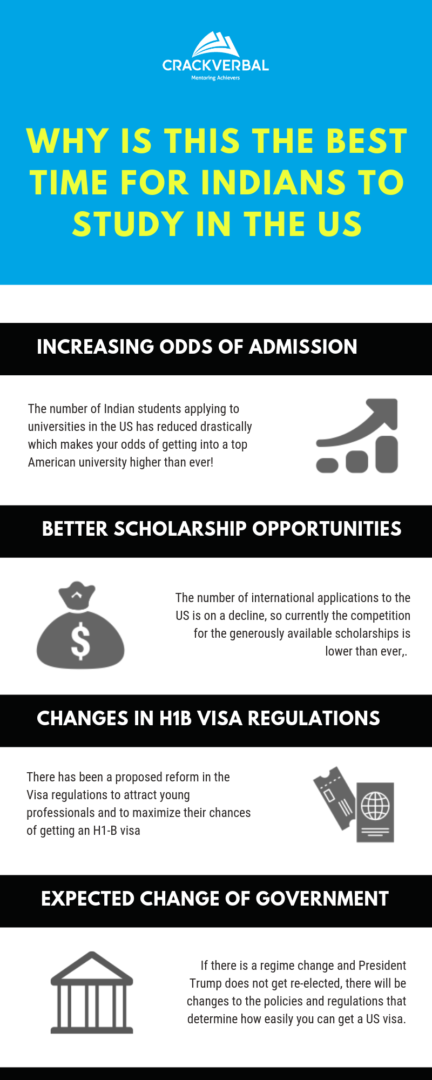Recent news reports show that Indian students have started choosing Australia and Canada as study abroad destinations rather than the US.
We believe there are two things that could have sparked this trend. One is the seemingly hostile political climate towards immigrants under President Trump’s administration. The second is the soaring costs of studying abroad.
However, both these are actually beneficial trends for Indian students who want to study in the US. In this article, we will talk about:
These are pertinent factors that greatly impact your decision to study abroad. So, let’s take a look at each one in further detail.
1. Increasing Odds of Admission
As per reports, the number of Indian students applying to universities in the US has reduced. The decline in the number of international applications has been sharp enough to spur US B-Schools into taking action to boost the numbers. In fact, even the Department of Homeland Security (DHS) took note and started offering STEM MBAs via US B-Schools to help attract international applications.
2. Better Scholarship Opportunities
You’re probably quite familiar with the price war that’s been on between e-commerce companies around the world. But did you know that the same has been going on between American universities? People have missed this phenomenon among news articles about rising tuition costs across the US. To be fair, it is quite true that tuition costs and other fees for higher education programs are rising.
3. Changes in H1B Visa Regulations
Statistics show that most students applying to universities in the US want to stay and work there, as well. Even though the current US government in 2020 is known to be anti-immigration, the US desperately needs qualified people to take up the jobs the economy is expected to generate in the near future.
4. Expected Change of Government
If you’re planning to apply to the US, you’re definitely aware of the socio-political climate. Or, at least, you should be – after all, Visa and immigration regulations are among the first things to get changed when the government changes! Every year, the US sees a massive influx of immigrants looking for a piece of the “American Dream”. As a result, immigrants and immigration reform are a huge part of public discourse and are highly vulnerable to political whims. For example, under President Obama, the American immigration policy was very immigrant-friendly but it became hostile nearly as soon as President Trump took over. Immigration is likely to play a pivotal role in the upcoming election of 2020.
To conclude, we find that 2020 is the best time for Indian students to study in the US because the competition is lower than ever, granting each Indian applicant greater access to scholarships.
The proposed changes in the process of granting H1-B Visas as well as the upcoming elections, both look promising for Indian students with advanced degrees from American universities.
We recommend that you start building your profile for your applications right away!

